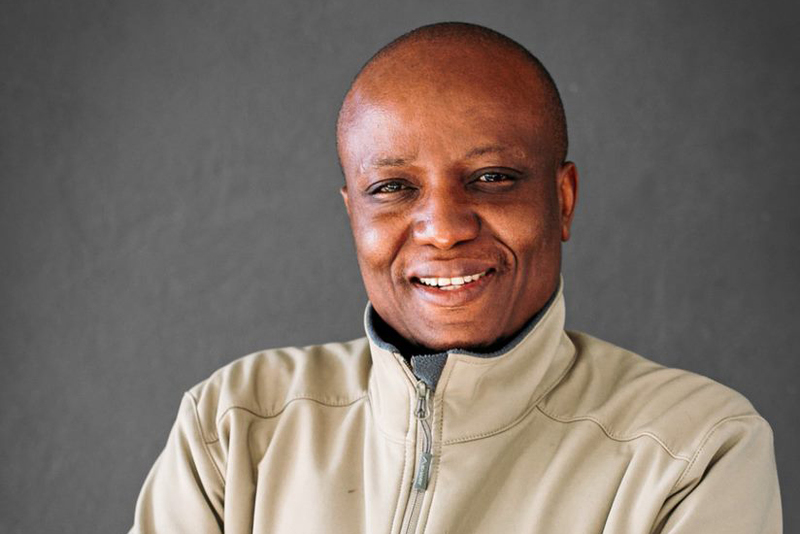Constructing leadership – Manya becomes head of department
04 November 2021 | Story Robert Morrell. Photo Supplied. Read time 5 min.
Manya Mooya became the Head of Department (HOD) in the Department of Construction Economics and Management in January 2021. He had been a member of the department since joining it in 2006 as a lecturer. Since then he has risen to the rank of associate professor.
Manya was born in rural Southern Zambia, in the Mazabuka district. He attended a boys’ boarding school where he learned, among other things, habits of discipline and industry. He proceeded to Kitwe after school, where he studied land economics at the Copperbelt University. During the course of his six years of study for a BSc (Honours) degree, he picked up a number of best student awards and the staff development fellowship award.
Manya completed an MPhil at Cambridge University before capping off his postgraduate career with a PhD at the University of Pretoria. Its title was “Real Estate Markets and Poverty Alleviation in Namibia’s Urban Informal Settlements: An Institutional Approach”.
“I don’t recall that I had any lofty ambitions in my childhood. As a matter of fact, I didn’t know what I wanted to be until much later in life, having dabbled with careers in engineering, law, architecture and aviation. I certainly didn’t imagine that I would be an academic and work at UCT.”
Manya traces his interest in scholarship and reading back to his school days. He discovered “a treasure trove of donated Western classics in the school where my parents worked”. These “sparked my interest in reading, and the world that opened up, a world that was then so remote from own experiences”. By the time he was 12 years old, he’d read most of Western children’s classics. “Nobody else bothered with them, they just gathered dust”, he remembers. “This experience left me with a love of reading and curiosity about the world that has continued to this day.”
The promotion trail
Manya says that he had a ‘broad plan’ when he came to UCT. This included publishing a book, Real Estate Valuation Theory: A Critical Appraisal (New York: Springer) in 2016, recruiting postgraduate students, raising research funding and involving himself in curriculum issues. “I had and have a general sense of the direction [in which] I would like to go. It needs to be broad enough to accommodate happenstance and detours, and these are inevitable.”
He describes the process of seeking ad hominem promotion as ‘complex’. “A number of factors must come together to ensure a successful outcome. Some of these factors are beyond the control of the candidate. Chances of promotion are enhanced where there is strong support from the HoD and verifiable evidence to support performance in the core assessment areas of research, teaching, administration and social responsiveness.”
Becoming an academic leader
Before becoming HoD, Manya discharged a number of administrative and managerial roles. He became a departmental programme convenor. He served on a number of faculty committees including the dean’s advisory committee. At university level he became a member of Senate, as well as of its executive committee.
“I think that I have a good sense and experience of how the university functions administratively. You can only really know this from actual experience. Opportunities to serve on these committees are of course not widely available (or desirable). The challenge is the sheer number of meetings, and the volume of documents to read. This has often left me concerned about the quality of decision-making. The positives for me have been being able to participate and influence decisions that have impact at faculty and university level.”
Thoughts on Transformation
Manya was nominated by his faculty to be a founder member of the Next Generation Professoriate (NGP). A goal of the NGP is to support its members to be promoted to associate or full professor. Manya reflects on his NGP membership and promotion thoughtfully. He initially saw his involvement in NGP “as a political act, to show support for the university’s transformation objectives”. He says that he found being in the NGP “useful for its process of structured goal-setting but also for the community created by the membership of the disciplinary diverse cohort”.
Since 2015 when the NGP began, “a lot has changed in the university”. Manya remains supportive of the goals of transformation but he also has reservations. “My views are more circumspect now. I am concerned about certain practices and tendencies that, in my view, threaten the future of the university as a world-class institution. Of particular concern has been what I perceive to be rising intolerance of alternative (to the mainstream) viewpoints, and the chilling effect that this has had on debate in the Senate itself. This, if unchecked, can only lead to institutional decay.”
Manya has been heavily involved in decolonizing the curriculum in his own department. But he says that thinking about decolonization needs to be more careful. “Beneath the politics and rhetoric, there needs to be a more nuanced understanding of different opportunities for decolonisation presented by different disciplines. In some disciplines, there is very little scope for ‘decolonisation’. To ignore this basic fact is to encourage unrealistic expectations.”
 This work is licensed under a Creative Commons Attribution-NoDerivatives 4.0 International License.
This work is licensed under a Creative Commons Attribution-NoDerivatives 4.0 International License.
Please view the republishing articles page for more information.






